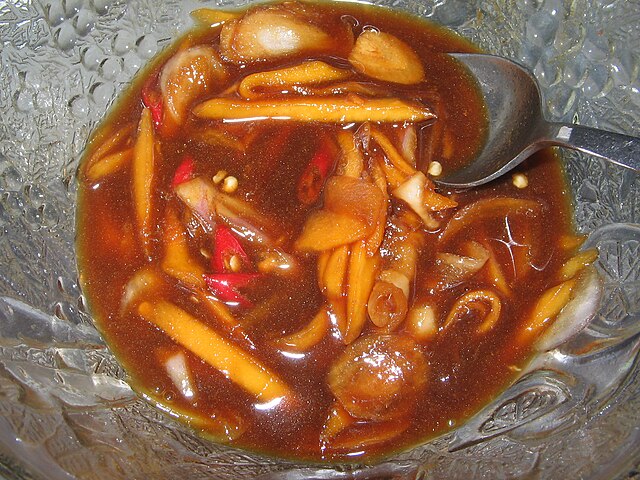The second part of the setting information I have for Loh is the cuisine writeup. As I've mentioned
before, serving yourself a helping of Wikipedia is just dandy for
setting detail, and what's listed below is mostly from the respective
articles on Malay and Indonesian cuisine. Bon appetit!
 |
| "I'm tellin' ya, it's made with orc meat! |
Food is *never* eaten with the left hand. Chefs pay attention to the fragrance of dishes, adding floral and herbal essences to produce tantalizing odors. These powerful essences – sometimes only one drop is needed – are sold by apothecaries.
Elements: Common ones include nasilemak (coconut rice) often used as a base. Other standard bases include meats stewed with thick gravy, seafood seasoned with turmeric, spicy noodle dishes, selaika (= peanut butter), serikaya (coconut jam). Channa is the foundational fried flatbread; it looks like a crepe, spread out until paper thin usually by "tossing" it on a flat surface, and gathered into a long rope-like mass. This "rope" is then wound into a knot or spiral and flattened. It is usually served with a vegetable- or meat-based curry, or used to eat a thick stew, and is also commonly cooked with cheese, onions, red beans, chocolate, mushrooms or eggs.
Condiments: coconut milk, lime juice, plum vinegar
belacan (sauce with chili peppers, shallots, garlic, fermented prawn paste)
sambalado (green chili blended with garlic, shallot, tomato, lime juice, salt, then sauteed with oil to make a reddish paste or relish)
goreng (fried shallot, red chili pepper, shrimp paste, salt, sauteed in coconut oil)
petai (chili, garlic, shallot, sugar, salt, crushed fried peanuts, sauteed in light oil; used for chicken dishes)
terasi (relish made of cucumber, cabbage, shallot, vinegar and pineapple)
kerisik (toasted and salted coconut shreds, appears dark brown)
curries (ariaya = chicken, aridagi = prawn, arikambi = mutton, ariika = fish, arikuda = bean)
Fruits: lychee, jackfruit, tamarind,
Spices: lemongrass, basil, nutmeg, turmeric, ginger, mustard seeds, fenugreek, galangal, pepper, cardamom, clove, cinnamon, coriander, anise – all traditionally stone ground.
dasar (shallot, garlic, coriander, lemongrass; used with so-called “white” dishes)
mera (red chili pepper, shallot, tomato, coconut sugar, salt; used with “red” dishes)
kunin (shallot, garlic, turmeric, coriander, ginger, black pepper; used with “yellow” dishes)
lawar (orange chili pepper, anise, turmeric, ginger; used with “orange” dishes)
Meats: Fish, prawns, goat, lamb, chicken
Drinks: Tea is often served with ginger, jasmine (Vydra) or other floral elements, or coconut milk
beras (rice beer)
dedén (potent drink made from seared cane sugar, thick, brownish, very intoxicating)
charaya (potent 90-proof drink distilled from rice wine)
goribon (coconut palm wine, milky white)
hanaza (distilled 60 proof rice brandy)
inlichi (low alcohol lychee wine)
kinomol (pale green rice wine, with different types of rice going into different blends)
oshikun (weak millet beer, sometimes flavored with peanut or hazelnut)
ruoma (plum wine)
traitha (pomegranate wine)
uladi (ginger wine, flavored with citrus; often cut with water to make a refreshing summer drink)
zivani (distilled and stiff plum brandy, lavender colored)
Dishes:
ambaka (charcoal-grilled chicken marinated in coconut oil and peanut sauce, with a spice rub before)
acari (pickled vegetables and fruit with dried chili, peanuts and spices)
ammasak (chicken casserole with sambalado and noodles, sometimes spiced with clove or anise)
angangi (chicken slices simmered in a tomato base with shallot, onion, garlic, galangal, pepper, and lime)
arisa (porridge/dumpling made from coarse-ground millet, mixed with seasoned minced meat)
begedil (rice noodles dressed in a gravy made from belecan, tamarind, cucumber and dried shrimp)
bobotin (spiced minced meat mixed with scrambled eggs)
gulai (goat stew with unripe fruit, turmeric, pepper, ginger, lemongrass and coconut milk)
kankang (bean stew served with cumin, onion, garlic, lemon juice and other optional ingredients)
kwetia (stirfried rice noodles with pork and spices)
laksa (spicy chicken/fish noodle soup)
maridzo (savory goat- or mutton stew made with raisins, slivers of fish fried in sugared sauce, various vegetables, and heavily spiced)
mikari (millet noodles with spicy curry soup)
nasibriyan (saffron rice with meat-and-vegetable curry)
nasikato (rice, minced fried chicken, belacan, with garlic, ginger, shallow, scallion, lime juice and/or vinegar as secondary ingredients, served in savory leaves)
tabak (channa formed into a spiraled pyramid, filled with meat, onion and spices, then deep fried)
urlambu (savory rice porridge made with a mixture of lemongrass and meat/veggie slivers, usually eaten communally)
Desserts:
burketan (brown rice porridge with coconut milk and sugar)
chendol (iced thick drink containing nokdumu, coconut milk, rice flour and dried fruit)
cucimul (thicker channa, sweetened with sugar, served with jam)
kaludol (minced fruit, rice flour, coconut milk)
melhdoá (thick fruit pudding, custard-consistency and served hot)
neninél (fruit sliced very thin and layered with perfumed sugar and spices over fine pastry sheets. Sometimes served with dreamdrowse or moondust between the layers as well)
nokdumu (lemongrass jelly, comes out black or dark green)
Street foods:
alèl (thin slices of meat smeared with hot spices and seed paste, then wrapped in leaves and baked in the ashes of a slow fire)
ambuya (sticky ball of sago or tapioca starch, alternately dipped into a spicy/sour gravy and a tomato base)
ampla (cracker made from river fish – usually mackerel – rice starch and seasonings, and deep fried)
lekor (savory fish cake)
lemang (rice, jackfruit and coconut milk cooked in a hollowed bamboo stick)
mélmél (fried rice kernels mixed with salt and spices, and served in little rice paper cones. Some vendors insert a tiny metal statue, coins and other “favors” into the mix for children)
murtabak (channa stuffed with curry gravy)
otakota (grilled fish cake made of ground fish meat mixed with tapioca starch and spices: ginger, turmeric, galangal, nutmeg, pepper, cardamom, tamarind)
No comments:
Post a Comment